This book stems from a concern to assist pastoral counsellors in developing a therapeutic alliance with African-American women. It focuses on the social construct of the African-American matriarch, which can easily misinform the counsellor and cause emotional jeopardy for African-American women who attempt to live up to its expectations.
"MarKeva Gwendolyn Hill has given us an insightful, practical, and profound work of pastoral theology. She illuminates not only the dilemma of African-American women and their relation to their mothers, but a much wider range of the human struggle against oppression and dehumanization. And she ventures to propose a pastoral approach centered on an understanding of forgiveness as a fundamental life process rooted in divine grace that is deeply informed, experientially, clinically, and theologically, and that empowers effective social action as well as personal healing and reconciliation. This is creative and significant liberationist pastoral theology; highly recommended!" - Rodney J. Hunter, Professor Emeritus of Pastoral Theology, Candler School of Theology, Emory University
"This book is a very intriguing, mind-expanding, well-written, and scholarly but practical examination and guide to how pastoral counseling can enable African American women to edit and re-author the matriarchal image into which they were recruited by slavery and racism. Its goal is to help the African American woman to become a womanist taking over the agency and control of her own identity formation as well as enabling mothers and daughters to forgive and become full human beings." - Edward P. Wimberly, Professor of Pastoral Care and Counseling, Interdenominational Theological Center
"This book is a very intriguing, mind-expanding, well-written, and scholarly but practical examination and guide to how pastoral counseling can enable African American women to edit and re-author the matriarchal image into which they were recruited by slavery and racism. Its goal is to help the African American woman to become a womanist taking over the agency and control of her own identity formation as well as enabling mothers and daughters to forgive and become full human beings." - Edward P. Wimberly, Professor of Pastoral Care and Counseling, Interdenominational Theological Center








